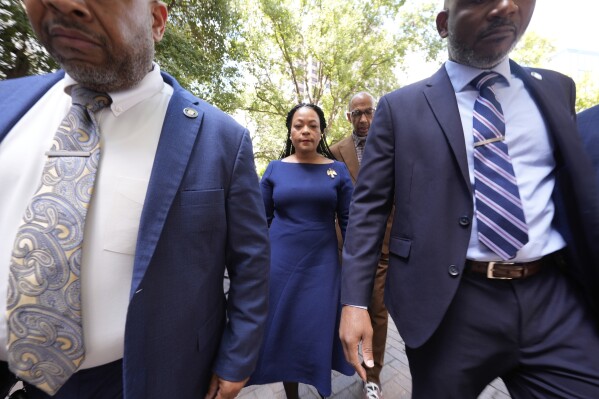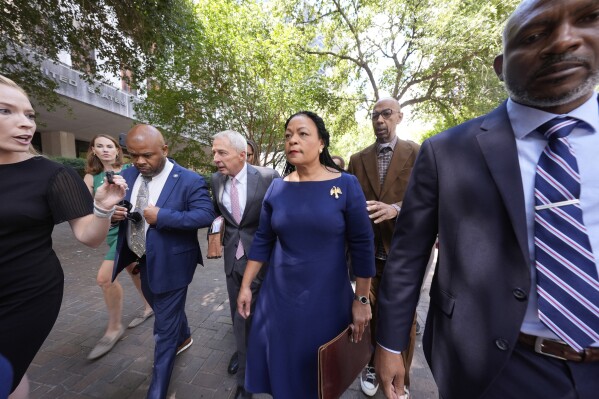A Gavel Aimed at the Voter’s Mind
Mayor LaToya Cantrell cannot run again. She is term-limited. Still the US Attorney dropped an indictment just weeks before the next election. The real fight is over how her indictment influences who turns out to vote.
That timing is the point. Dropping federal charges weeks before the mayoral election does not change her political future—she is term-limited. But it can change the psychology of the electorate. It can sap energy from Black voters who feel betrayed. It can spark new energy among white voters who see the charges as proof that a “clean break” is needed.
Related: 2025 Mayoral Race: Black Power at Stake
Why Timing Matters
Indictments before elections do two things. They discourage supporters of the accused. They also fire up opponents who see the case as proof of corruption. Researchers have found that scandals near elections change who shows up and who stays home.
HUD’s letter freezing city contracts made the blow even sharper. It turned allegations into visible punishment. To the public, the message was simple: City Hall cannot be trusted. That feeling can move more voters than the legal facts.
We Have Seen This Before
This is not new. In 2020, Jason Williams was indicted just before he qualified to run for District Attorney. He still won, but the race became a fight about trust instead of policy.
Other cities offer the same lesson. Baltimore’s Sheila Dixon. Baltimore’s Catherine Pugh. High Point’s Bernita Sims. New York’s Eric Adams. Detroit’s Kwame Kilpatrick. Washington’s Marion Barry. Each faced charges near elections that shaped turnout and voter mood.
Chart: Indictments and Election Timing
| Official | City | Indictment | Election Context | Effect on Voters |
|---|---|---|---|---|
| Jason Williams | New Orleans DA | Tax fraud (2020) | Weeks before qualifying | Race reframed as trust test |
| Sheila Dixon | Baltimore Mayor | Theft, misconduct (2009) | In office with election looming | Support weakened, resigned |
| Catherine Pugh | Baltimore Mayor | Fraud, conspiracy (2019) | Before 2020 race | Collapsed base, resigned |
| Bernita Sims | High Point Mayor | Bad check (2013) | Before election | Resigned, career ended |
| Eric Adams | New York Mayor | Bribery, campaign finance (2024) | Months before primary | Agenda buried under scandal |
| Kwame Kilpatrick | Detroit Mayor | Racketeering, fraud (2008–10) | Across cycles | Deepened public cynicism |
| Marion Barry | DC Mayor | Drug charges (1990) | Election year | Polarized turnout, racial split |
The Real Target: Voters
Cantrell cannot pick her successor. In New Orleans, mayors rarely do. The real target of the indictment is not her political future. It is the mood of the electorate.
- Black voters may feel tired. If the Black mayor is branded corrupt, many may ask, “Why bother voting?”
- White voters may feel validated. A scandal reinforces the idea that only a “clean” white candidate can fix the city. That can push them to turn out in larger numbers.
- Media coverage keeps the wound open. Each new court date or agency letter refreshes the headline. Voters see corruption first, not crime, insurance, or jobs.
Beyond New Orleans
Is there proof of a national plan to bring down Black mayors? No. But there is a pattern. Indictments against Black leaders often land close to elections. The result is the same: doubt among their base, confidence among their rivals.

Scandals can be real. Charges may stick. Yet the timing shapes outcomes before a jury speaks. That is politics by other means.
What Comes Next
HUD has already acted. Other agencies may follow. Each move feeds the same message: City Hall cannot be trusted. That shapes how people vote.
The mayor’s indictment now overshadows every other issue. The election is no longer about crime or insurance. It is about competence and who defines leadership in New Orleans.
The gavel came down on Cantrell. But the real blow landed on the voters. If timing, not truth, decides who runs the city, then democracy itself is the loser.
YOU CAN STILL REGISTER TO VOTE ONLINE AT CLICK HERE

